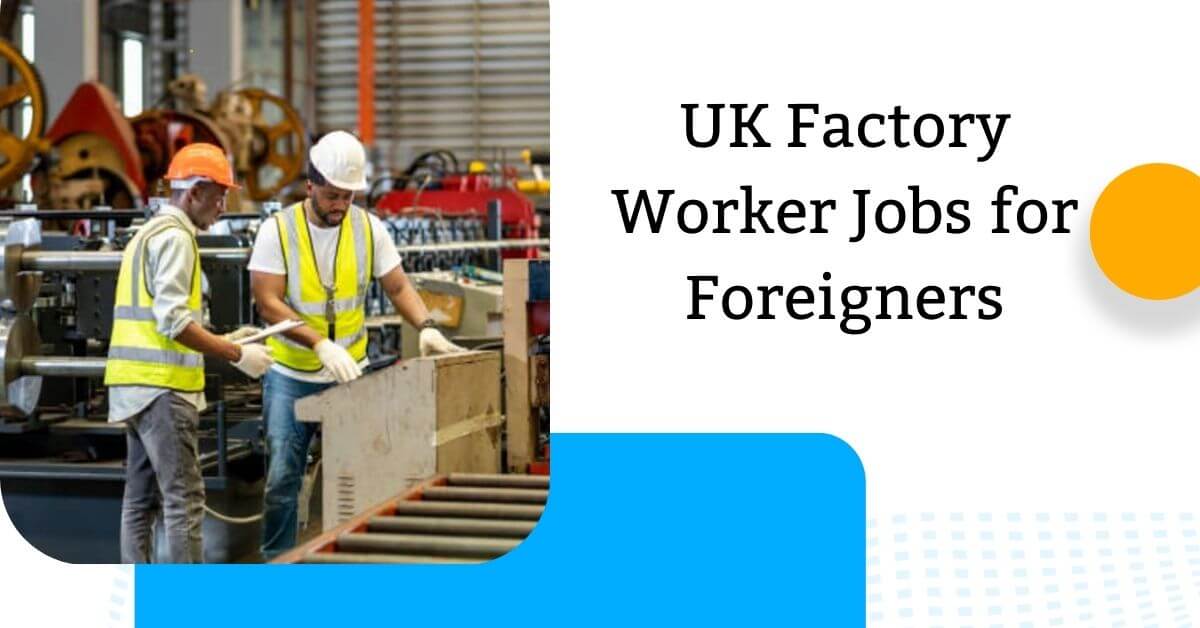If you want to work as a factory worker in Italy and have your visa expenses covered, 2026 is a great year to do it in one of Europe’s industry hubs. Italy’s manufacturing sector is expanding rapidly, creating numerous opportunities for foreign workers. Many companies in Italy provide visa sponsorship to help international applicants work legally and smoothly in the country.
In Italy, factory workers operate machines, assemble products on production lines, and package goods as part of the manufacturing process. Italy has a strong industrial base producing a wide range of goods, including cars, electronics, clothing, and food. Most jobs are in large companies or manufacturing plants.
Factory Worker Jobs in Italy With Visa Sponsorship. Employers often assist foreign workers with the visa application process and provide the necessary documentation. In some cases, Italy actively recruits international workers to fill gaps in the workforce, particularly in the industrial sector. Factory workers in Italy earn an average of €14 per hour, which is approximately €27,774 per year.
Details of Jobs:
- Title: Factory Worker Jobs in Italy With Visa Sponsorship
- Country: Italy
- Job Types: Permanent Full-time
- Visa Sponsorship: Yes
- Gender: Male // Female
- Qualifications: No degree, certificate or diploma
- Age Limit: 20 Years Above
- Experience: Not required
- Who Can Apply: International Applicants
- Salary: Average Salary €14 Per Hour
Types of Factory Worker Jobs in Italy:
- Machine Operator: Runs the factory’s machines and makes sure that production goes smoothly by doing regular repairs and fixing problems as they come up.
- Assembler: On the production line, they put together things like cars, electronics, and tools according to plans and quality standards.
- Packer: In charge of preparing things for distribution by making sure they are properly labeled and packed securely.
- Quality Control Inspector: Makes sure that goods meet quality standards by inspecting and testing them to find flaws and making sure they meet specifications.
- Forklift Operator: Moves things around the workplace and is often found in the shipping and receiving areas, where they load and unload products while following safety rules.
Requirements:
- Work Experience: In some factories, you may need to have worked in a similar position before, while in others, new workers are trained on the job.
- Physical Fitness: It’s important to be physically fit for factory work because you have to stand for long amounts of time, lift heavy things, and work in fast-paced environments.
- Basic Education: Depending on how hard the work is, some jobs may need someone with a high school education or the equivalent.
- Language Skills: For communication, knowing basic Italian is often good, but some international companies may hire people who speak English.
Benefits of Factory Worker Jobs in Italy:
- Competitive Wages: Factory workers in Italy frequently receive equitable compensation, including wages that are consistent with industry standards and the possibility of receiving overtime pay.
- Employment Benefits: Italian labor laws mandate that workers receive social security benefits, such as healthcare, pension contributions, and unemployment insurance.
- Job Stability: Job Stability: In Italy, factory jobs frequently offer long-term contracts or stable employment opportunities, which provide workers with financial security.
- Diverse Opportunities: The manufacturing sector in Italy encompasses a diverse range of industries, including automotive, textiles, food processing, and machinery, which enables employees to select positions that align with their abilities.
- Overtime and Bonuses: Numerous factory positions provide overtime pay, productivity bonuses, and holiday allowances, which enable employees to generate additional income.
- Access to Training: Numerous employers offer on-the-job training, which allows employees to develop new skills and progress in their careers.
- Paid Holidays: Employees are entitled to paid vacation days and public holidays, which promote a healthy work-life balance.
- Workplace Safety: Italian labor laws mandate stringent safety regulations to guarantee that factory workers operate in a secure and regulated environment.
- Opportunities for Foreign Workers: Italy is a country that encourages the employment of foreign workers in its manufacturing sector. Numerous factories offer assistance with legal documentation and work permits.
- Cultural Exposure: While employed in Italy, foreign laborers have the opportunity to immerse themselves in the country’s culture, language, and lifestyle.
- Team Environment: Factory jobs frequently necessitate cooperation, which cultivates a sense of community and collaboration among employees.
- Standard Shifts: The majority of factory positions in Italy operate on standard shifts, which guarantees predictable working hours and personal time.
- Access to Family Benefits: Certain employers offer family benefits, including caregiver assistance or allowances for dependents.
- Growth Opportunities: The factory provides opportunities for hardworking employees to advance to supervisory or management positions, which can lead to career advancement.
- Union Support: A significant number of factory workers in Italy are members of unions that advocate for improved working conditions, wages, and benefits.
Salary:
In Italy, a Factory Worker makes about €27,774 a year, or €14 an hour. As a general rule, a factory worker makes between €27,285 and €36,509.
How to Apply For Factory Worker Jobs in Italy?
Should you be interested in this position, please visit the link provided above.
Conclusion:
It appears to be a favorable year for foreign nationals who wish to obtain sponsorship for their visas and work in Italian factories. It is advantageous to contemplate relocation at this time due to the abundance of employment opportunities in a rapidly expanding sector. Working in Italy can provide an opportunity to experience a vibrant culture and advance in your career, whether you are a beginning professional or seeking a new challenge. Don’t overlook this opportunity; evaluate your alternatives and submit your application immediately.
Frequently Asked Questions:
What types of factory jobs are available in Italy?
Factory worker roles in Italy include positions in manufacturing, packaging, assembly lines, machine operation, and quality control, often in industries like automotive, textiles, and food processing.
How much do factory workers earn in Italy?
Factory workers in Italy typically earn between €1,200 and €1,800 per month, depending on the industry, location, and level of experience. Some companies may also provide additional benefits.
What are the requirements for factory jobs in Italy for foreigners?
Foreign workers usually need a valid work visa and permit. Basic knowledge of Italian may be required for communication, though some roles accept English-speaking workers. Physical fitness and the ability to work in shifts are often necessary.






